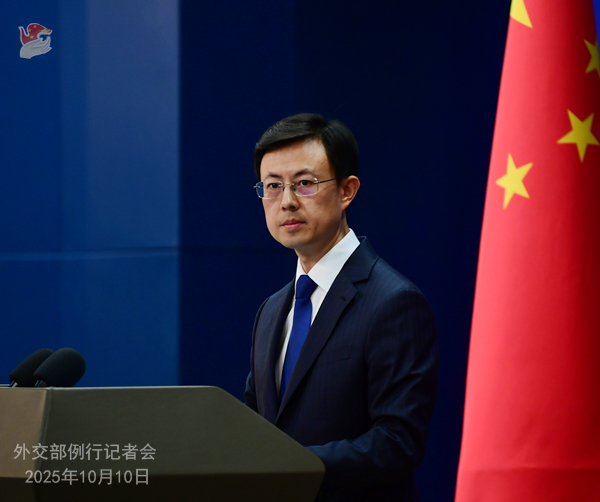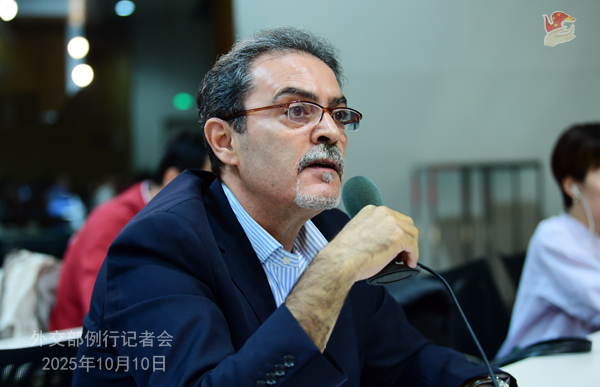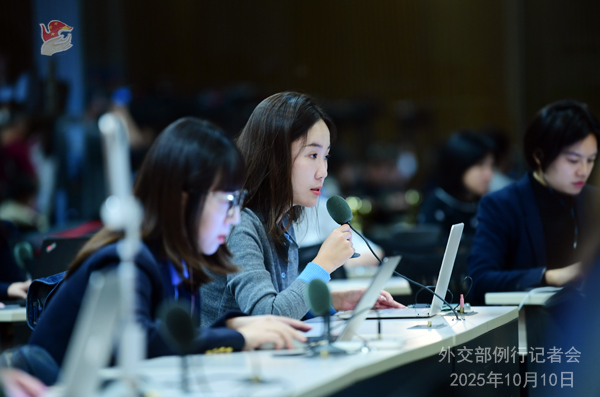
People’s Republic of China


CCTV: We noted that Foreign Minister Wang Yi just concluded his visit to Italy. Could you share more information about the visit?
Guo Jiakun: From October 8 to 9, Foreign Minister Wang Yi paid a visit to Italy upon invitation. In Italy, he met with President Sergio Mattarella. He also held talks with Deputy Prime Minister and Minister of Foreign Affairs and International Cooperation Antonio Tajani, and together they attended the 12th Joint Meeting of the China-Italy Government Committee. The two sides had candid and in-depth exchanges of views on bilateral relations and the international landscape and reached important common understandings on fostering a more stable and fruitful China-Italy relationship. The visit was a full success.
This was a journey to carry forward friendship. China and Italy have a long history of friendly exchanges, which have grown stronger over time. The development of China-Italy relations is built upon historical interactions and driven by the need for win-win cooperation. Both sides agreed to carry forward the traditional friendship, deepen political mutual trust, and actively implement the action plan on strengthening the comprehensive strategic partnership, so as to contribute to the economic development of both countries and benefit the two peoples. The Italian side stated its firm commitment to the one-China policy and said it will never waver in this regard.
This was a journey to deepen common understanding. Both sides agreed that China and Italy, both time-honored civilizations, should draw wisdom and inspiration from history, of which they have rich resources, to offer rational and practical solutions to pressing global challenges. Both China and Italy advocate the values for peace and cooperation, support multipolarity and multilateralism, and stay committed to addressing differences through dialogue and consultation. The Italian side agreed with the vision of building a community with a shared future for humanity and welcomed the series of major initiatives proposed by President Xi Jinping, believing that they are what the international community needs and people across the world want.
This was a journey to expand cooperation. Both sides agreed that the China-Italy Government Committee, as the most important mechanism for planning and coordinating the development of bilateral relations, has played a positive role in delivering on the important common understandings reached by leaders of the two countries and promoting exchanges and cooperation across various fields. It has earned the trust and wide support from various sectors in both countries. The minutes of the meeting are detailed and substantive, covering economy and trade, investment, people-to-people and cultural exchanges, and sub-national cooperation. They chart the course for China-Italy cooperation moving forward. The two sides stand ready to promote the sustained growth of trade and investment and provide facilitation for enterprises from both sides to invest in each other’s market. The two sides agreed to hold the 14th China-Italy Science, Technology & Innovation Week and the forum of university presidents this year, and promote cooperation and experience sharing in agricultural technology, marine science, renewable energy, health, environmental protection, disaster management and other fields. The two sides will take the opportunity of the Milan-Cortina Winter Olympics to enhance mutual support and deepen people-to-people friendship and bond.
China News Service: On October 10, Lai Ching-te delivered an address, in which he once again made “Taiwan independence” remarks, asking the mainland to “cease its distortion of United Nations General Assembly Resolution 2758” and saying Taiwan “will work to uphold the status quo” and “ensure peace and stability across the Taiwan Strait.” What’s your comment on that?
Guo Jiakun: Lai Ching-te’s address called white black and confused right and wrong. He peddled the false narrative of “democracy v.s. authoritarianism,” repeated the same old fallacies for “Taiwan independence,” and distorted and challenged historical facts and international consensus. These words once again laid bare his true nature as a diehard troublemaker, danger-creator and warmonger.
There is but one China in the world and Taiwan is an inalienable part of the Chinese territory. This is the real status quo across the Taiwan Strait. The biggest threats to peace and stability in the Taiwan Strait at present are the separatist activities for “Taiwan independence” and external interference. The Lai Ching-te authorities made up various disinformation in an attempt to seek “Taiwan independence” and resist reunification through military buildup. Such moves will only push Taiwan towards the danger of military conflict. To maintain cross-Strait peace and stability, one must uphold the one-China principle and unequivocally oppose “Taiwan independence.” The Taiwan question is purely China’s internal affair. Opposition to “two Chinas” or “one China, one Taiwan” and support for the complete reunification of China are part of the international community’s commitment to the one-China principle.
This year marks the 80th anniversary of the victory of the Chinese People’s War of Resistance Against Japanese Aggression and the World Anti-Fascist War, and the restoration of Taiwan. International legal instruments, including the Cairo Declaration, the Potsdam Proclamation, and the Japanese Instrument of Surrender, have affirmed China’s sovereignty over Taiwan. Taiwan’s restoration to China is an important outcome of the victory of the World Anti-Fascist War. Once and for all, UNGA Resolution 2758 resolved, politically, legally and procedurally, the issue of the representation of the whole of China, including Taiwan, at the UN. It solemnly confirms and fully demonstrates that the one-China principle is not only the iron rule that must not be bent, but also an absolute principle that is part and parcel of the existing international order. Any attempt to tamper with historical facts or challenge Resolution 2758 amounts to challenges to China’s sovereignty and territorial integrity, the UN’s authority and the post-war international order. Such moves blatantly turn back the wheel of history. They are not only ridiculous but also extremely dangerous.
China firmly opposes any form of official interactions between China’s Taiwan region and countries having diplomatic ties with China. We urge the few foreign politicians who are visiting Taiwan to stop interfering in China’s internal affairs and stop abetting and supporting “Taiwan independence” activities at once. These wrongful words and moves, be it for selfish gains or for the malign attempt of using Taiwan to contain China, are all miscalculating, and it is just futile to try to stop China’s inevitable reunification.
Anadolu Agency: Yesterday, the Israeli government approved an agreement to end the war in Gaza. The agreement is reported to include the withdrawal of Israel’s forces from the territories that they invaded during the war and exchange of prisoners with Palestinian factions. What is China’s comment?
Guo Jiakun: China hopes that a comprehensive and permanent ceasefire in Gaza will be realized as early as possible, the humanitarian crisis will be effectively eased, and tensions in the region will be diffused. China upholds the principle of “the Palestinians governing Palestine” and promotes the implementation of the two-State solution. We stand ready to work with the international community to make unremitting effort towards an early, full, just and lasting resolution of the Palestinian question and a peaceful and stable Middle East.
Reuters: Taiwan will build a new multi-layered air defense system called “T-Dome.” Does the Foreign Ministry have any comment?
Guo Jiakun: The Lai Ching-te authorities’ attempt of seeking “Taiwan independence” and resisting reunification through military buildup will only push Taiwan towards the danger of military conflict. To uphold peace and stability in the Taiwan Strait, one must uphold the one-China principle and unequivocally oppose “Taiwan independence.” China is firmly opposed to the U.S.’s arms sales to and military ties with China’s Taiwan region. This position is consistent and unequivocal.

Al Araby TV Network: The International Criminal Court accused Israel of committing war crimes in Gaza and started the judicial proceedings against Israeli government officials. There have been growing calls within the international community for holding relevant individuals, including Netanyahu, legally accountable. My first question is whether China will join them in making these calls? Many believe this is critical for ending the Israeli war crimes in Gaza. Second, does China intend to impose sanctions on Israeli settlers who attack Palestinians in the villages and towns on the West Bank? Will China impose sanctions on extremists within the Israeli government, like the sanctions that European countries imposed on Israeli Security Minister Ben-Gvir and Finance Minister Smotrich?
Guo Jiakun: On your first question, on the question of Palestine, China always stands on the side of fairness and justice, and on the side of international law, opposes all acts that violate international law including international humanitarian law, and condemns all moves that harm civilians and all attacks on civilian facilities. China supports all effort in the international community conducive to realizing fairness and justice and defending the authority of international law on the question of Palestine.
On your second question, China opposes Israel building settlements on the occupied territories of Palestine. The UN Security Council has clarified that the construction of such settlements violates international law. With a ceasefire just reached and the situation still highly fragile in Gaza, Israel should refrain from taking any inflammatory and escalatory actions.
The Paper: A recent Western media report said that China provided a large amount of weapon supplies to Cambodia. The report, which drew some attention, questioned China’s neutral position on the border conflict between Cambodia and Thailand, and misrepresented China’s defense cooperation with relevant country. What is China’s response to this?
Guo Jiakun: Since the outbreak of the border conflict between Cambodia and Thailand, as a friendly neighbor of both countries, China has upheld a just and fair position and made active effort to promote talks for peace. The foreign ministers of China, Cambodia and Thailand reached outcome in China’s Anning, Yunnan Province; the three countries held an informal consultation; and the Chinese Foreign Ministry’s Special Envoy for Asian Affairs made several shuttle-diplomacy trips for peace between the two sides. With the active efforts of China, Malaysia and various parties, Cambodia and Thailand reached a ceasefire agreement and the two sides are in communication via bilateral mechanisms. Relevant parties have spoken highly of China for playing an irreplaceable role in this process.
China supports Cambodia and Thailand in settling disputes through dialogue and consultation, and supports Malaysia, as the rotating chair of ASEAN, in promoting the political settlement of the issue through the ASEAN Way. China stands ready to, in light of the will of Cambodia and Thailand, continue promoting talks for peace in our own way and playing a constructive role for consolidating the ceasefire agreement and advancing the peaceful settlement of the dispute.
China carries out normal defense cooperation with all ASEAN countries, including Cambodia and Thailand. Individual Western media outlet tried to use such cooperation to sow discord between China and relevant country. Such attempt will never succeed.
AFP: Can you tell us who China will send to COP30 next month? And also has the lack of accommodation in the host city affected the size of China’s delegation which appears to have done with other countries?
Guo Jiakun: China supports Brazil in making the United Nations Climate Change Conference in Belém a full success. On China’s attendance at the conference, we will release information in due course. Please stay tuned.
Reuters: The Trump administration on Thursday proposed banning Chinese airlines from flying over Russia on route to and from the U.S., saying that the reduced flight time puts American carriers at a disadvantage. Does the Foreign Ministry have any comment?
Guo Jiakun: I’d refer you to competent authorities for the specifics. Barring Chinese airlines from flying over Russia on flights to and from the U.S. would hinder travel and people-to-people exchanges. Rather than punishing other countries and passengers around the world, perhaps it’s time the U.S. took a hard look at its own policy and the impact on American businesses.
Shenzhen TV: We’ve learned that recently another Chinese national was wrongfully interrogated and detained when entering the U.S., whose personal freedom was restricted for more than 48 hours before repatriation. Can I have your comment on that?
Guo Jiakun: In disregard of China’s repeated serious representations, relevant U.S. departments have been wantonly harassing, interrogating and repatriating Chinese nationals with harsh law enforcement. Such moves severely damage the lawful rights and interests as well as the dignity of Chinese nationals concerned, and disrupt normal people-to-people exchanges between China and the U.S. China expresses strong indignation and condemns the incident.
We call on the U.S. law enforcement authorities to immediately stop this kind of erroneous practice, act faithfully on the important common understandings between the two presidents, uphold friendly exchanges between the peoples of the two countries and take effective steps to prevent such incidents from happening again.
China will stay firmly committed to safeguarding the legitimate and lawful rights and interests of Chinese nationals overseas, and we once again remind those traveling to the U.S. to be mindful of such risks.
Bloomberg: The U.S. has sanctioned more than 50 individuals, firms and vessels involved in exporting Iranian oil and liquefied petroleum gas. This includes a Chinese company. Would the Ministry like to comment? Does the Ministry foresee this causing any energy security problems?
Guo Jiakun: China opposes unilateral illicit sanctions that have no basis in international law or authorization of the UN Security Council. We urge the U.S. to abandon the wrong practice of arbitrarily resorting to sanctions. Countries’ normal cooperation with Iran within the framework of international law is legitimate and justified. China will do what is necessary to ensure its energy security and safeguard the lawful rights and interests of Chinese companies and citizens.
Kyodo News: Japan’s Komeito has decided to leave the ruling coalition formed with the Liberal Democratic Party. What’s China’s comment?
Guo Jiakun: This is Japan’s internal affair and we have no comment on that.




